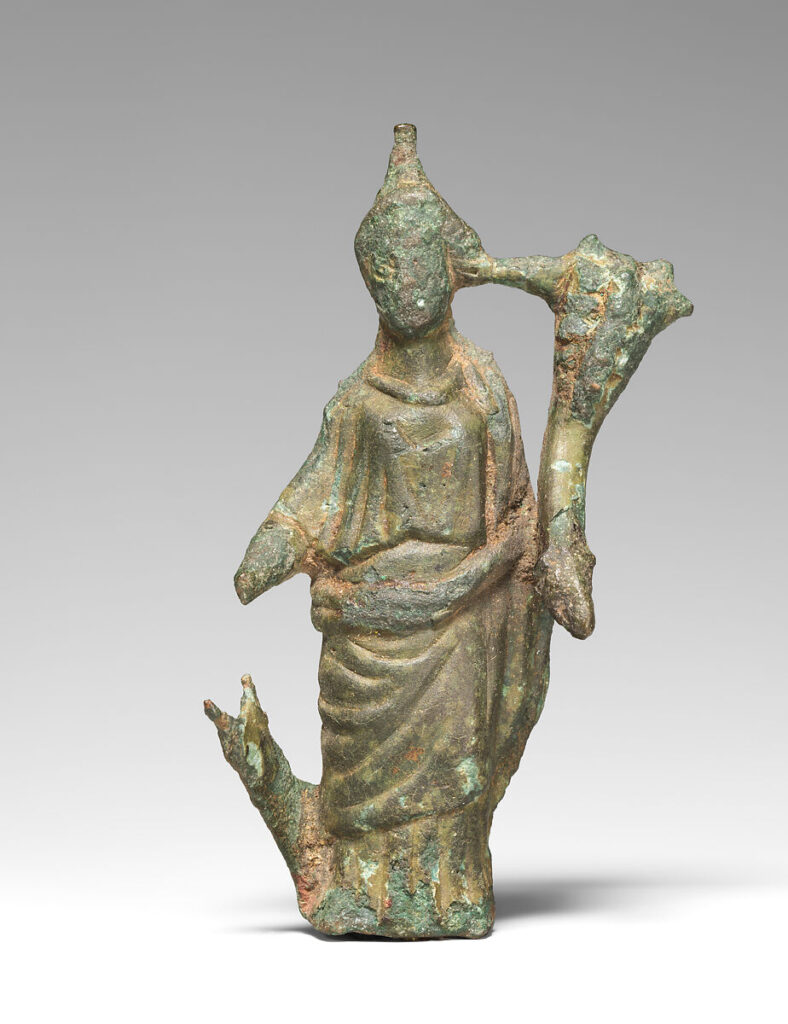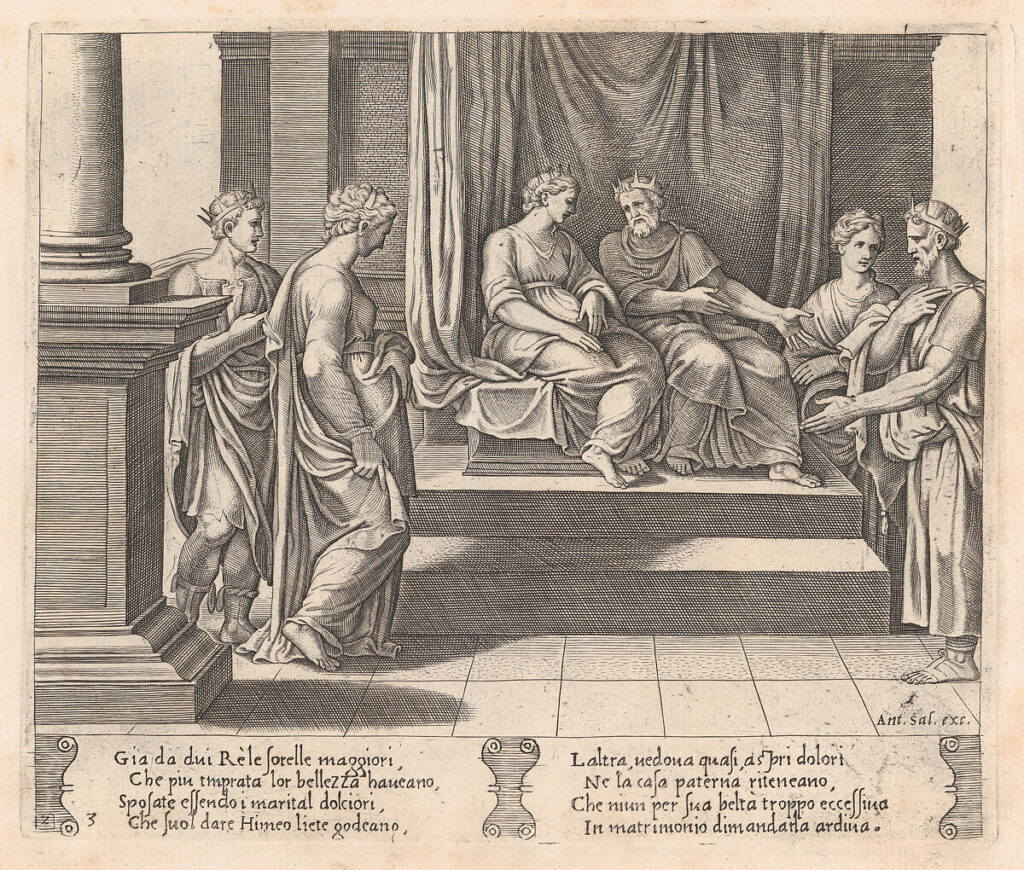
5.9
[1] Quō prōtenus perpetratō sorōrēs ēgregiae domum redeuntēs iamque glīscentis invidiae felle fraglantēs multa sēcum sermōnibus mūtuīs perstrepēbant. [2] Sīc dēnique īnfit altera: “Ēn orba et saeva et inīqua Fortūna! Hōcine tibī complacuit, ut utrōque parente prōgnātae germānae dīversam sortem sustinēremus? [3] Et nōs quidem quae nātū maiorēs sumus marītīs advenīs ancillae dēditae extorrēs et lare et ipsā patriā dēgāmus longē parentum velut exulantēs, [4] haec autem novissima, quam fētū satiante postrēmus partus effūdit, tantīs opibus et deō maritō potīta sit, quae nec utī rēctē tantā bonōrum cōpiā nōvit? [5] Vīdistī, soror, quanta in domō iacent et quālia monīlia, quae praenitent vestēs, quae splendicant gemmae, quantum praetereā passim calcātur aurum. [6] Quodsī marītum etiam tam formōnsum tenet ut affirmat, nūlla nunc in orbe tōtō fēlīcior vīvit. Fortassis tamen prōcēdente cōnsuētūdine et adfectiōne rōborātā deam quoque illam deus marītus efficiet. Sīc est, herculēs, sīc sē gerēbat ferēbatque. [7] Iam iam sūrsum respicit et deam spīrat mulier, quae vōcēs ancillās habet et ventīs ipsīs imperitat. [8] At ego misera prīmum patre meō seniōrem marītum sortīta sum, dein cucurbitā calviōrem et quōvīs puerō pusilliōrem, cūnctam domum serīs et catēnīs obditam cūstōdientem.”
Psȳchē’s sisters, enraged by seeing her wealth, have a gripe session.
prōtenus: alt. spelling of prōtinus.
felle: The association of bodily fluids with moods is common in ancient medicine. Yellow and black bile are 2 of the 4 humors, bodily fluids seen as causes of illness in ancient humoral theory (Vallance, OCD s.v. “humours”).
fraglantēs: an alt. form of flāgro, -āre (OLD sv. flagro).
Hōcine: See 5.6.2.
orba: Fortuna is often described as devoid of sight or eyes. Here, the word meaning sight or eyes has been omitted, but the sense is that Fortune is blind (Kenney, ad loc).
ut…sustinēremus a substantive result clause in apposition with hōcine, with a sense of “(the fact) that…” (A&G §570).
Et nōs quidem: “and we, for instance” (Kenney ad loc).
parentum: an uncommon usage of the genitive with longe. Translate similar to an abl. of separation. (Kenney ad loc. and DMLBS).
novissima: The sense is that Psȳchē is the youngest child (Kenney ad loc.).
fētū satiante: “in/by a wearying birth” (Kenney ad loc.).
postrēmus: the superlative form of posterus, -a, -um.
potīta sit: deponent verb, takes abl. object.
iacent… praenitent… splendicant…calcātur: indicatives in place of subjunctives in an indirect question (Kenney ad loc.).
calcātur aurum: Notice the inversion of typical Latin word order.
Fortassis: alternative from of fortasse.
Sīc est, Herculēs: “By Hercules” is a gendered expression used almost exclusively by men. The sister’s usage of the curse is a notable inversion of gender roles (Kenney ad loc.).
gerēbat ferēbatque: The similar meanings appear to have an emphatic effect.
spīrat: here, has a sense of expressing or manifesting. Psȳchē is carrying herself like a goddess (Kenney ad loc.).
ancillas: functions with voces as a predicate acc.
marītum: Contrast the sisters’ descriptions of their husbands with the impression of their beatae nuptiae to kingly husbands given in Met. 4.32, reflected in the 16th-cen. engraving under Media.
glīsco, -ere: to blaze up, burst out
fel, fellis n.: bile, wrath, bitterness
perstrepō, -ere, -uī, -itum: to make noise, resound
infit: See 5.5.1.
Ēn: interjection similar to ecce, but used in an ironic or angry sense.
complaceō, -ēre, -uī, -itus: to please greatly, please also
prōgnātus, -a, -um: born, descended, sprung forth
germānus, -a, -um: (born) of the same father, with the same parents, sibling
extorris, -e: exiled, banished, driven from the country (+ abl. of separation)
dēgō, -ere, -ī: to pass/spend (time), carry on
fētus, -ūs m.: bringing forth, bearing, birth
satiō, -āre: to satiate, satisfy; (in negative sense) cause weariness
praeniteō, -ēre, -uī: to shine or glitter forth
splendicō, -āre: to glitter, shine, sparkle
ad/affectio, -ōnis f.: mental state, feeling, esp. feeling of love
rōborō, -āre: to strengthen, make strong, confirm
sursum (adv): up, upward
imperitō, -āre: to command, govern, rule (+ acc. or dat.)
cucurbita, -ae f.: gourd
calvus, -a, -um: without hair, bald
pusillus, -a, -um: very little, puny
sera, -ae f.: a bolt or cross bar
obdō, -dere, -didi, -ditus: to shut, close, fasten

This is a statue of Fortuna from the 100s CE (Metropolitan Museum of Art, New York). Here, although she is not depicted as blind, she is carrying a cornucopia and holding a ship’s rudder. These items represent Fortuna’s role in abundance and her role in deciding outcomes, respectively (“Fortuna,” Encyclopedia Britannica, 2019).

This engraving, from an unknown artists called Master of the Die, comes from a book of engravings based on Apuleius’ version of the Cupid and Psȳchē. It is entitled, “Psȳchē’s sisters are married to two kings, with Psȳchē standing at left, accompanied by another king”. This image of the kings is far from the description of them that will follow, making the artistic choice to doubt the sisters’ words. (Metropolitan Museum of Art, New York)